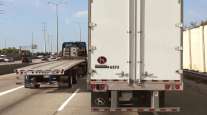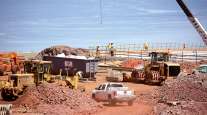ATA’s Graves Cites Transportation Needs as Election-Year Casualty, Blasts Parties
This story appears in the May 14 print edition of Transport Topics.
ARLINGTON, Va. — American Trucking Associations President Bill Graves blasted federal lawmakers in a recent speech, telling an audience of a shippers’ association here that the upcoming election has halted the legislative process and Republicans’ pushes to decrease the federal role in transportation are missing the mark, among other criticisms.
“The impediments of getting stuff done are very real,” Graves said. “It’s very, very disappointing.” His remarks May 8 kicked off the National Industrial Transportation League’s annual policy forum just outside Washington.
“There’s a sense already that a lot of people are starting to put everything on hold, that we’re just all going to wait to see what happens in November,” Graves said.
Lawmakers tend to look toward elections as chances to get the people they want into office in order to do the work they want to get done, he said. The entire House and one-third of the Senate are subject to replacement every two years.
Graves, himself a Republican and a former governor of Kansas, said he supports former Massachusetts Gov. Mitt Romney, also a Republican, in the upcoming presidential election, which is scheduled for November.
“I think he would be good for business in this country,” Graves said of Romney. President Barack Obama has pushed a “fairly aggressive regulatory agenda” toward trucking and other businesses, and Graves said he is fearful of what a second Obama term would mean for regulation.
But Graves also warned that Romney, if elected, would not solve what he said were persistent problems Congress has in passing some initiatives ATA supports, such as increased infrastructure spending.
Central to the infrastructure problem is the tendency among some lawmakers, especially Republicans, to push for transportation funding responsibilities to be handled largely by the states, he said.
“That may seem like a great idea if you’re sitting here in Washington and you want to avoid the responsibility of having to make some tough decisions,” Graves said. “All it does is, it sends everything downstream to 50 states, and you have the same process again: Where do you get the money?”
Furthermore, increasing state responsibility would likely create a “patchwork” of infrastructure and transportation policies in which states largely differ, which would be bad for trucking, Graves said.
He also criticized what he saw as a recent push in Congress to allow increased highway tolling, such as tolls on existing interstate highways and promoting public-private partnerships that use tolls. Instead, Congress should increase fuel taxes to pay for infrastructure, he said.
“To me, the solution has been obvious, and that has been [that] we need to increase the federal motor fuel tax,” Graves said. “But that is the last thing that is going to happen on Capitol Hill.”
Republicans often push back against fuel tax increases because they oppose taxes, but Graves said fuel taxes are the “conservative approach” to highway funding and that Republicans should embrace them.
“Tolling is not a conservative answer,” he said.
Graves did not limit his criticisms to Republicans, however. Democrats “tend to have this sense that every solution has to do with a government program,” an opinion he strongly disagrees with, he said.
He called himself a political centrist on most issues, adding in jest that centrists, once common in the United States, now “could meet in a phone booth.”
Graves thanked NITL for its support of ATA’s lawsuit challenging the Federal Motor Carrier Safety Administration’s hours-of-service rule published in December. NITL joined the federal lawsuit in March.
“We think there are some elements to that rule that were just not as they should be,” he said. “And so, to have NIT League back us up and intervene . . . was greatly appreciated.”




